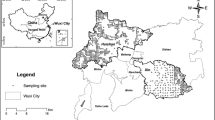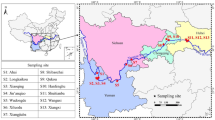Abstract
The concentrations of Hg, Cu, Pb, Cr, and Ni in soil samples collected from a specialized salt production site at Zhongba in the Three Gorges Reservoir region of the Yangtze River in China were analyzed to reconstruct the heavy metal contamination contexts of different historic periods over the last 4,500 years. The results show that the observed sequence for individual levels of heavy metal pollution was as follows: Hg > Cu > Ni > Pb ≈ Cr. Hg pollution was high during every time period except the Ming Dynasty, with peaks being observed from the Spring and Autumn period. The pollution of Cu and Ni peaked during the Xi Zhou and Xia Dynasties, respectively. The pollution level of Pb has gradually increased since the Qin Dynasty and has coincided with the use of leaded gasoline. Cr contamination was moderate in all soil strata with little indication of change. Comprehensive heavy metal contamination was high during all of these periods, except during the Ming Dynasty, with peaks being observed between the Spring and Autumn Period and throughout the Warring States Period. Enrichment factors (EFs) were used to obtain information on heavy metal sources. The EFs indicate that most of the Hg and Cu originated from human activities, whereas Pb, Cr, and Ni predominantly came from crust weathering. Several preliminary inferences regarding the development of heavy metal utilization in the area were generated. Cu usage had developed well during the Xi Zhou Dynasty and the Autumn Period. Hg usage emerged during the Xia Dynasty and matured between the Spring and Autumn Period and the Warring States Period. Ni usage conceivably started during the Xia Dynasty. Other factors, such as religious activities, technology, environmental awareness and the intensity of salt production, have also affected heavy metal pollution concentrations.





Similar content being viewed by others
References
Alexandrovskaya EI, Alexandrovskiy AL (2000) History of the cultural layer in Moscow and accumulation of anthropogenic substances in it. Catena 41:249–259
Armin S, Richard Y, Matt H, Mike A (2005) Magnetic susceptibility as proxy for heavy metal pollution: a site study. J Geochem Expl 85:109–117
Aston MA, Martin MH, Jackson AW (1998) The use of heavy metal soil analysis of archaeological surveying. Chemosphere 37:465–477
Avilova LI (2009) The metal ages and medieval period. Archaeol Ethnol Anthropol Eur 37:50–58
Biasiolia M, Barberis R, Ajmone-Marsan F (2006) The influence of a large city on some soil properties and metals content. Sci Total Environ 356:154–164
Chatterjee A, Banerjee RN (1999) Determination of lead and other metals in a residential area of greater Calcutta. Sci Total Environ 227:175–185
Chwarz GT (1967) A simplified chemical test for archaeological fieldwork. Archaeometry 10:57–73
Clare AW, Donald AD, Malcolm SC (2008) Multi-element soil analysis: an assessment of its potential as an aid to archaeological interpretation. J Archaeol Sci 35:412–424
Cook SR, Clarke AS, Fulford MG (2005) Soil geochemistry and detection of early Roman precious metal and copper alloy working at the Roman town of Calleva Atrebatum (Silchester, Hampshire, UK). J Archaeol Sci 32:805–812
Cook DE, Kovacevich B, Beach T, Bishop R (2006) Deciphering the inorganic chemical record of ancient human activity using ICP-MS: a reconnaissance study of late Classic soil floors at Cancue’n, Guatemala. J Archaeol Sci 33:628–640
Craddock PT, Gurney D, Pryor F, Hughes MJ (1985) The application of phosphate analysis to the location and interpretation of archaeological sites. J Archaeol 142:361–376
Craig GS, Lawrence KD, Maribeth SM, Peter MB, Rachel A, David AV (2006) An exploratory study of total mercury levels in archaeological caribou hair from northwest Alaska. Chemosphere 65:1909–1914
De Ryck I, Adriaens A, Adams FA (2005) An overview of Mesopotamian bronze metallurgy during the 3rd millennium BC. J Cult Herit 6:261–268
Eckel WP, Rabinowitz MB, Foster GD (2002) Investigation of unrecognized former secondary lead smelting sites: confirmation by historical sources and elemental ratios in soil. Environ Pollut 117:273–279
Eliyahu-Behar A, Shilstein S, Raban-Gerstel N, Goren Y, Gilboa A, Sharon I, Weiner S (2008) An integrated approach to reconstructing primary activities from pit deposits: iron smithing and other activities at Tel Dor under Neo-Assyrian domination. J Archaeol Sci 35:2895–2908
Entwistle JA, Dodgshon RA, Abrahams PW (2000) An investigation of former land-use activity through the physical and chemical analysis of soils from the Isle of Lewis, Outer Hebrides. Archaeol Pr 7:171–188
Flad RK (2004) Specialized salt production and changing social structure at the prehistoric site of Zhongba in the Eastern Sichuan Basin, China. Dissertation for the doctoral degree. University of California, Los Angeles, pp 235–270
Griffith MA (1981) A pedological investigation of an archaeological site in Ontario, Canada: use of chemical data to discriminate features of the Benson site. Geoderma 25:27–34
Helen W (2010) Soil science applications in archaeological contexts: a review of key challenges. Earth Sci Rev 103:122–134
Jeffrey L, Howard DO (2011) Pedogenesis, geochemical forms of heavy metals, and artifact weathering in an urban soil chronosequence, Detroit, Michigan. Environ Pollut 159:754–761
John D, Li XQ, Ji M, Zhao Kl, Zhou XY, Vladimir L (2009) Early bronze in two Holocene archaeological sites in Gansu, NW China. Quat Re 72:309–314
Johnson KD, Terry RE, Jackson MW, Golden C (2007) Ancient soil resources of the Usumacinta River Region, Guatemala. J Archaeol Sci 34:117–1129
Kelly J, Knudson LF (2010) Ethnoarchaeological analysis of Arctic fish processing: chemical characterization of soils on Nelson Island, Alaska. J Archaeol Sci 37:769–783
Knudson KJ, Frink L, Hoffman BW, Price TD (2004) Chemical characterization of arctic soils: activity area analysis in contemporary Yup’ik fish camps using ICPAES. J Archaeol Sci 31:443–456
Marwick B (2005) Element concentrations and magnetic susceptibility of anthrosols: indicators of prehistoric human occupation in the inland Pilbara, Western Australia. J Archaeol Sci 32:1357–1368
Nocete F, Alex E, Nieto JM, Saez R, Bayona MR (2005) An archaeological approach to regional environmental pollution in the south-western Iberian Peninsula related to third millennium BC mining and metallurgy. J Archaeol Sci 32:1566–1576
Oonk S, Slomp CP, Huisman DJ, Vriend SP (2009) Geochemical and mineralogical investigation of domestic archaeological soil features at the Tiel-Passewaaij site, the Netherlands. J Geochem Expl 101:155–165
Peter J (1999) Soil variability in the area of an archaeological site near Sparta, Greece. J Archaeol Sci 26:1273–1288
Pyatt FB, Barker GW, Birch P, Gilbertson DD, Grattan JP, Mattingly DJ (1999) King Solomon’s miners—starvation and bioaccumulation? An environmental archaeological investigation in southern Jordan. Ecotoxicol Environ Saf 34:305–308
Pyatt FB, Amos D, Grattan JP, Pyatt AJ, Terrell-Nield CE (2002) Invertebrates of ancient heavy metal spoil and smelting tip sites in southern Jordan: their distribution and use as bioindicators of metalliferous pollution derived from ancient sources. J Arid Environ 52:53–62
Reimer PJ, Baillie MGL, Bard E, Bayliss A, Beck JW, Blackwell PG, Ramsey CB, Buck CE, Burr GS, Edwards RL, Friedrich M, Grootes PM, Guilderson TP, Hajdas I, Heaton TJ, Hogg AG, Hughen KA, Kaiser KF, Kromer B, McCormac FG, Manning SW, Reimer RW, Richards DA, Southon JR, Talamo S, Turney CSM, Plicht J, Weyhenmeyer CE (2009) IntCal09 and Marine09 radiocarbon age calibration curves, 0–50,000 years cal BP. Radiocarbon 51:1111–1150
Shi W, Zhu C, Ma CM, Zhu Q (2008) Records of Paleoclimate and mankind activities since 4250 aB.P. in Zhongba site, Chongqing. Sci Geogr Sin 28:704–708 (in Chinese)
Shi NN, Ding YF, Zhao XF, Wang QS (2010) Heavy metals content and pollution risk assessment of cropland soils around a pesticide industrial park (in Chinese). Chin J Appl Ecol 21:1835–1843
Snyder WS, Cook MJ, Nasset ES, Karhausen LR, Parry HG, Tipton IH (1975) Report of the task group on reference man. Int Com Rad Pr. Pergamon Press, Oxford, p 23
CEMS (China Environmental Monitoring Station) (1990) Background value of elements in soils of China. China Environmental Science Press, Beijing, pp 353–378 (in Chinese)
Stuiver M, Reimer PJ (1993) Extended 14C data base and revised CALIB 3.0 14C age calibration program. Radiocarbon 35:215–230
Stuiver M, Reimer PJ, Bard E, Beck JW, Burr GS, Hughen KA, Kromer B, McCormac G, Plicht J, Spurk M (1998) INTCAL98 radiocarbon age calibration, 24,000–0 cal BP. Radiocarbon 40:1041–1083
Tang WZ, Shan BQ, Zhang H, Mao ZP (2010) Heavy metal sources and associated risk in response to agricultural intensification in the estuarine sediments of Chaohu Lake Valley, East China. J Hazard Mater 176:945–951
Terry RE, Ferna’ndez FG, Parnell JJ, Inomata T (2004) The story in the floors: chemical signatures of ancient and modern Maya activities at Aguateca, Guatemala. J Archaeol Sci 31:1237–1250
Wilson CA, Davidson DA, Cresser MS (2008) Multi-element soil analysis: an assessment of its potential as an aid to archaeological interpretation. J Archaeol Sci 35:412–424
Wu S, Xia XH, Lin C, Chen X, Zhou C (2010) Levels of arsenic and heavy metals in the rural soils of Beijing and their changes over the last two decades (1985–2008). J Hazard Mater 179:860–868
Zeng HA, Wu JL (2009) Sedimentary records of heavy metal pollution in Fuxian Lake, Yunnan Province, China: intensity, history, and sources. Pedosphere 19(5):562–569
Zhang GL, Yang FG, Zhao WJ, Zhao YG, Yang JL, Gong ZT (2007) Historical change of soil Pb content and Pb isotope signatures of the cultural layers in urban Nanjing. Catena 69:51–56
Zhu C, Zheng CG, Ma CM (2005) Identifying paleoflood deposits archived in Zhongba Site, the Three Gorges reservoir region of the Yangtze River, China. Chin Sci Bull 50:2493–2504
Acknowledgments
This work was supported by the National Natural Science Foundation of China (NNSF, Award No. 40971115 and Award No. 41171163), the University Doctoral Foundation (Award No. 20090091110036), the Test Foundation of Modern Analyses Center of Nanjing University (Award No. 0209001309) and the foundation of the Ministry of Science and Technology of the People’s Republic of China (Award No. 2010BAK67B02) and the China Postdoctoral Science Foundation (Award No. 2010048113). The constructive comments from James W. LaMoreaux and two anonymous reviewers on earlier drafts of this paper are gratefully acknowledged.
Author information
Authors and Affiliations
Corresponding author
Rights and permissions
About this article
Cite this article
Tian, X., Zhu, C., Sun, Z. et al. An evaluation of heavy metal pollution within historic cultural strata at a specialized salt production site at Zhongba in the Three Gorges Reservoir region of the Yangtze River, China. Environ Earth Sci 69, 2129–2138 (2013). https://doi.org/10.1007/s12665-012-2042-z
Received:
Accepted:
Published:
Issue Date:
DOI: https://doi.org/10.1007/s12665-012-2042-z




